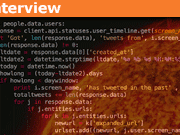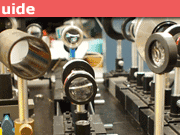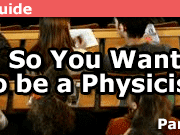How to Survive the First Year of College As a Physics Major
Full Chapter List - So You Want To Be A Physicist... Series
Part I: Early Physics Education in High schools
Part II: Surviving the First Year of College
Part III: Mathematical Preparations
Part IV: The Life of a Physics Major
Part V: Applying for Graduate School
Part VI: What to Expect from Graduate School Before You Get There
Part VII: The US Graduate School System
Part VIII: Alternative Careers for a Physics Grad
Part VIIIa: Entering Physics Graduate School From Another Major
Part IX: First years of Graduate School from Being a TA to the Graduate Exams
Part X: Choosing a Research area and an advisor
Part XI: Initiating Research Work
Part XII: Research work and The Lab Book
Part XIII: Publishing in a Physics Journal
Part XIV: Oral Presentations
Part XIII: Publishing in a Physics Journal (Addendum)
Part XIV: Oral Presentations – Addendum
Part XV – Writing Your Doctoral Thesis/Desertation
Part XVI – Your Thesis Defense
Part XVII – Getting a Job!
Part XVIII – Postdoctoral Position
Part XIX – Your Curriculum Vitae
Part II: Surviving the First Year of College
This part covers the survival tips of the first two undergraduate years. So now you’re in college, and you have every intention to be a physics major (actually, what I’m about to describe applies to anyone who is taking a physics class, not just for physics majors). In most US universities, as a freshman, you do not have a major-specific academic advisor, mainly because most freshmen do not have an officially-declared major. What you would probably get during your first week is ”generic” advising based on what you INTEND to go into. In all likelihood, assuming that you have all the necessary background, it is a safe bet that you would need the complete sequence of Calculus (typically a year, or 3 semesters worth). This would cover all the basic calculus and analytical geometry (level of Thomas-Finney), and towards the end of the sequence, may superficially cover more advanced topics such as vector calculus and partial differential equations. As a physics major, you will need more mathematics than this, and that includes a separate mathematics course in the two advanced topics that I have mentioned, and maybe even a course on complex analysis. These are the courses that you may have to take after you complete the calculus sequence (more discussion on mathematics in the next installment of this series).
The introduction of physics courses can vary from school to school. Typically, the broad dichotomy would be Intro Physics with or without calculus. As a physics major, you would take the former. This means that, if you do not have any calculus background, you may have to delay your first physics class after you have at least completed the first semester of your calculus class (high-school students, take note of this!). The typical intro physics courses in US universities would be at the level of Halliday-Resnick. It is typically covered in 2 or 3 semesters and is intended to be a general survey of many different aspects of physics. These courses tend to be accompanied by laboratory work, which is intended to be an introduction to a systematic experimental study of various physics concepts.
I would like to expand on the importance of such laboratory work, mainly because for many students, this is looked upon as a waste of time, especially if the experiments and laboratory conditions are less than ideal. There are certain things that cannot be taught but can only be acquired. These are what we call skills. The reason why one has to physically DO something during a laboratory session is to acquire such skills. This does not just mean physical skill, such as the ability to read an ammeter, to be able to perform a task with the least amount of errors, etc., but also mental skills, such as analytical ability to look at the object of the experiment and figuring out why certain things are done certain ways. This includes the ability to critically analyze the experimental data to extract relevant information. Upon completion of such exercise, one must then be able to clearly explain in words and pictures (graphs) what one did, and the results. Again, such ability is important for obvious reasons and it is a skill that can’t be taught. It can only be acquired through practice!
Note that what I have described above is not just applicable to physics majors. Such skills that can be acquired are important to anyone, regardless of one’s major. In fact, I would make the assertion that acquiring such skills is MORE important for most students in a physics class than knowing the material. It is a fact that the majority of students in a physics class are not physics majors. Although the knowledge of physics is important as a foundation for other classes, for most of the students, the skills that can be acquired through physics classes and laboratories are the more valuable traits that they will carry with them throughout their academic life and beyond. The ability for critical analysis and knowing the reliability of data and results are important skills that are useful in all everyday life.
If you are an undergraduate in a US university, there is no excuse for not enrolling yourself in The Society of Physics Students (SPS). This organization is open to all students, not just physics majors. As part of your membership dues, you are a year subscription to Physics Today, a journal that practically all physicists read and contain timely information on the world of physics and physicists. You will also get a newsletter and information specifically targeted for undergraduates like you, and also entitles you later on to significant discounts and even free registrations to attend various physics conferences. In other words, if you have even half a brain, enroll in this! The benefits are just too great not to. Go to the physics department at your school and ask if they have a chapter of the SPS there. You can enroll via your school’s chapter. If there isn’t any, go to the SPS website at http://www.aip.org/education/sps/index.html and you may enroll there as an individual member. It is NEVER too early to be a member, so do it as soon as you are settled. If you are not in a US university, you may still subscribe to Physics Today by going to their website at http://www.aip.org/pt/
Throughout your first 2 years, the BEST thing you can do for yourself is to get excellent grades. This, I’m sure, goes without saying, but you have to realize that typically, these are the easiest and the most important courses you will see in your undergraduate years. They are the foundation that you will build on for your other courses, and they are the ones you have a better chance of achieving the highest grades. Do not be discouraged if you feel that at this stage, you are one of the many anonymous ”numbers” in a large class. Most classes at this level tend to be huge and it isn’t easy to distinguish oneself from the crowd (you will have plenty of opportunities to distinguish yourself later on). But do not let this stop you from seeing the instructor during his/her office hours, or using the Teaching Assistants if you need help. They have been PAID to do just that!
In the next installment, we will discuss the transition between the intro classes and the more advanced undergraduate classes, and your first tentative steps towards distinguishing yourself from other students.
Next Chapter: Part III: Mathematical Preparations
PhD Physics
Accelerator physics, photocathodes, field-enhancement. tunneling spectroscopy, superconductivity








Thank you for your wonderful insights.I want to join the society of physics students, but I will be studying in Germany. Is it worth paying the $30 annual due, or should I just subscribe to the Physics Today? Are there be SPS events outside US?Apparently if you are a SPS member, they don't even give the Physics Today if you don't live in the US, you only get an online copy.
There is at least one typo: "… you are a year subscription to Physics Today…"I believe that one of the useful skills to begin to learn in the first year laboratory course is the ability to keep a good lab notebook. My first year physics lab instructor liked to give everyone a copy of a section from "Zen and the Art of Motorcycle Mechanics" that discussed what a good notebook should contain. I enjoyed reading this, and as I got older, I appreciated the material even more. I also think that the first year is not too early to think about summer research. Funding agencies, as well as educators are stressing the importance of early engagement in research for STEM students interested in becoming a scientist. If this is what you want to do, you should talk with your professors. Make sure to tell them that you are not going to medical school! (Pre-meds are notorious for seeking out these types of things as med school application burnishers. I believe that Professors are more interested, though, in working with people who are interested in doing science.)